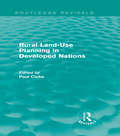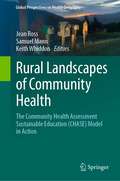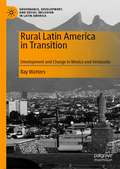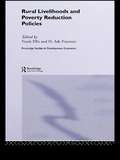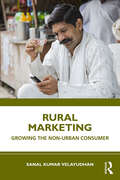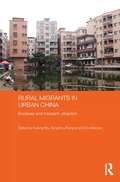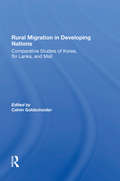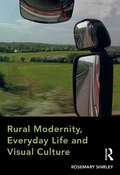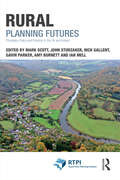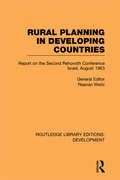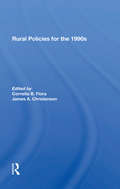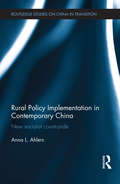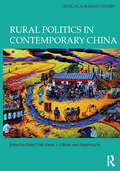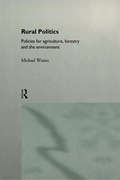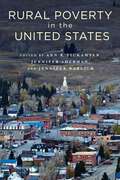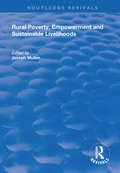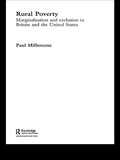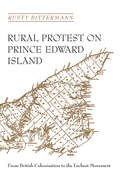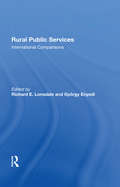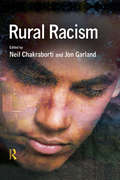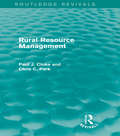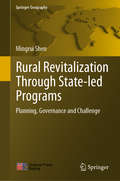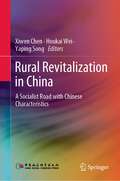- Table View
- List View
Rural Land-Use Planning in Developed Nations (Routledge Revivals)
by Paul ClokeThis edited collection, first published in 1989, provides a detailed analysis of rural land-use policies on a country-specific basis. Case studies include analyses of planning and legislation in Britain, The Netherlands, Japan, the U.S.A. and Australia. Alongside a comprehensive overview of the concept and application of rural land use from Paul Cloke, environment issues, resource management and the role of central governments are topics under discussion throughout. At an international level, this title will of particular interest to students of rural geography and environmental planning.
Rural Landscapes of Community Health: The Community Health Assessment Sustainable Education (CHASE) Model in Action (Global Perspectives on Health Geography)
by Jean Ross Samuel Mann Keith WhiddonThe book describes a novel method of engaging rural communities in partnership initially with nurse learners to research and employ the Community Health Assessment Sustainability Education (CHASE) model. CHASE provides a consolidated structure that immerses nurse learners in community development in partnership with their group peers, community organisations and educational supervisors. The book engages with community development practitioners, community activists including rural health practitioners who provide services to rural populations, undergraduate health disciplines, postgraduate learners, educators, and researchers. The CHASE system is described in detail and offers case studies on its application in a variety of geographical contexts. CHASE is a starting point that does not set out to impose a single understanding – it is adapted in practice to rural communities’ requirements. Therefore, capturing how this model has been adapted within diverse international rural communities to accommodate community needs is paramount and aligned with each individual case study presented in the book. CHASE enhances collaborative relationships in the global landscape informing nursing curricula, and teaching and learning pedagogy internationally with a view to reduce health disparities. This book is a valuable resource of pioneering work that spans disciplines and promotes collaboration among stakeholders invested in rural community health. By weaving together connections between disciplines and communities, the authors highlight the importance of spatial thinking and its impact on health and well-being. Readers are given a comprehensive exploration of the challenges of indigenous, minority, and vulnerable rural populations presented as insightful narrative, case studies. - Kate Emond, Rural Department of Nursing and Midwifery, La Trobe University, Australia The Editors have skillfully incorporated on interdisciplinary focus on the CHASE Model. The authors facilitate and evaluate favorable social change, enhance healthcare delivery systems and improve social determinants of health via interdisciplinary actions within community development. - Angeline Bushy, University of Central Florida College of Nursing, USA
Rural Latin America in Transition: Development and Change in Mexico and Venezuela (Governance, Development, and Social Inclusion in Latin America)
by Ray WattersThis book provides an in-depth and broad study on rural Latin America over a 60-year period. Using a case study approach of Mexico and Venezuela, peasants and lower rural classes are examined at the local, meso and national levels. Additionally, the study analyzes government policies, development, and leadership in each country. Latin America has tried to ride the waves of globalization, worldwide economic and environmental crises; the author examines Mexico and Venezuela's relations with the political hegemony of superpowers like the US, EU and China. The material will appeal to researchers, graduate students and policy makers in the fields of rural development, Latin American politics, and international relations.
Rural Livelihoods and Poverty Reduction Policies (Routledge Studies in Development Economics #Vol. 42)
by Frank Ellis H. Ade FreemanThis important new collection of contributions brings together current thinking on poverty reduction and rural livelihoods in developing countries. As well as leading economists in the field such as Frank Ellis and Chris Barrett, there are a number of contributors from developing countries themselves. The book examines both macroeconomic and microeconomic phenomena and contains wide range of case studies. Skilfully exposing the gap that exists between the rhetoric of poverty reduction strategies in capital cities and the practice of public sector delivery in rural areas, this key text will be essential reading for advanced students and researchers in the fields of rural development, rural livelihoods, poverty reduction strategies and Sub-Saharan Africa development as well as advisors and practitioners in international organizations.
Rural Lives and Landscapes in Late Byzantium
by Gerstel, Sharon E. J.This is the first book to examine the late Byzantine peasantry through written, archaeological, ethnographic, and painted sources. Investigations of the infrastructure and setting of the medieval village guide the reader into the consideration of specific populations. The village becomes a micro-society, with its own social and economic hierarchies. In addition to studying agricultural workers, mothers, and priests, lesser-known individuals, such as the miller and witch, are revealed through written and painted sources. Placed at the center of a new scholarly landscape, the study of the medieval villager engages a broad spectrum of theorists, including economic historians creating predictive models for agrarian economies, ethnoarchaeologists addressing historical continuities and disjunctions, and scholars examining power and female agency.
Rural Marketing: Growing the Non-urban Consumer
by Sanal Kumar VelayudhanRural markets offer a sizable and resilient pool of consumers to organizations and marketers. This book offers a comprehensive understanding of the fundamentals of rural marketing that influence consumer behaviour within the framework of a rapidly changing economy. The book: - includes in-depth discussions on critical issues in rural markets as well as case-studies that examine their socio-cultural nuances, peculiarities, and their economic and technological environments; - looks at concepts that are unique to rural markets from the perspective of the buyer and the marketer and analyses buying behaviour and its influences as well as the pricing, value, and positioning of products by brands; - analyses emerging trends and the future of these markets and the introduction of digitization and ecommerce in rural areas; - offers marketing tools and a detailed understanding of rural markets for professionals working in small or low-income markets. The cutting-edge learning tools presented in this book will make it of interest to professionals, students, and researchers working in rural marketing and management, business and economics, management studies, business planning, and marketing.
Rural Migrants in Urban China: Enclaves and Transient Urbanism (Routledge Contemporary China Series)
by Fulong Wu Chris Webster Fangzhu ZhangAfter millions of migrants moved from China’s countryside into its sprawling cities a unique kind of ‘informal’ urban enclave was born – ‘villages in the city’. Like the shanties and favelas before them elsewhere, there has been huge pressure to redevelop these blemishes to the urban face of China’s economic vision. Unlike most developing countries, however, these are not squatter settlements but owner-occupied settlements developed semi-formally by ex-farmers turned small-developers and landlords who rent shockingly high-density rooms to rural migrants, who can outnumber their landlord villagers. A strong state, matched with well-organised landlords collectively represented through joint-stock companies, has meant that it has been relatively easy to grow the city through demolition of these soft migrant enclaves. The lives of the displaced migrants then enter a transient phase from an informal to a formal urbanity. This book looks at migrants and their enclave ‘villages in the city’ and reveals the characteristics and changes in migrants’ livelihoods and living places. Using an interdisciplinary approach, the book analyses how living in the city transforms and changes rural migrant households, and explores the social lives and micro economies of migrant neighbourhoods. It goes on to discuss changing housing and social conditions and spatial changes in the urban villages of major Chinese cities, as well as looking into transient urbanism and examining the consequences of redevelopment and upgrading of the ‘villages in the city’; in particular, the planning, regeneration, politics of development, and socio-economic implications of these immense social, economic and physical upheavals.
Rural Migration In Developing Nations: Comparative Studies Of Korea, Sri Lanka, And Mali
by Calvin GoldscheiderWhat is the relationship between migration and rural social structure? How does the selective movement out of rural areas affect the economic and social conditions of migrants, their families, and their places of origin? Addressing these and other questions, the contributors to this book consider rural migration patterns in the context of social change and economic development in three less developed nations: Korea, Sri Lanka, and Mali. Through comparative analysis the authors reveal both the diversity and the cross-national similarities of rural migration, offering theoretical bases for its interpretation and pointing to policy implications for developing areas.
Rural Modernity, Everyday Life and Visual Culture
by Rosemary ShirleyThrough the lens of the everyday, this book explores ’the countryside’ as an inhabited and practised realm with lived rhythms and routines. It relocates the topography of everyday life from its habitually urban focus, out into the English countryside. The rural is often portrayed as existing outside of modernity, or as its passive victim. Here, the rural is recast as an active and complex site of modernity, a shift which contributes alternative ways of thinking the rural and a new perspective on the everyday. In each chapter, pieces of visual culture - including scrapbooks, art works, adverts, photographs and films - are presented as tools of analysis which articulate how aspects of the everyday might operate differently in non-metropolitan places. The book features new readings of the work of significant artists and photographers, such as Jeremy Deller and Alan Kane, Stephen Willats, Anna Fox, Andrew Cross, Tony Ray Jones and Homer Sykes, seen through this rural lens, together with analysis of visually fascinating archival materials including early Shell Guides and rarely seen scrapbooks made by the Women’s Institute. Combining everyday life, rural modernity and visual cultures, this book is able to uncover new and different stories about the English countryside and contribute significantly to current thinking on everyday life, rural geographies and visual cultures.
Rural Nostalgias and Transnational Dreams
by Nicola MooneyRenowned as the predominant farmers and landlords of Punjab, and long possessed of an autocthonous agricultural identity, Jat Sikhs today often live urban and diasporiclives. Rural Nostalgias and Transnational Dreams examines the formation and meaning of Jat Sikh identity in the contemporary Indian city.Nicola Mooney describes a number of Jat Sikh social practices and narratives through which contemporary notions of identity are developed. She contextualizes these elements of Jat Sikh modernity against local, regional, and national histories of cultural and political differentiation, perceptions of marginality, and the expression of increasingly exclusive notions and practices of identity. This unique ethnography incorporates first-hand observations and local narratives to develop insights into the traditions and social memory of Jat Sikhs, as well as on the issues of urban and transnational social transformation.
Rural Planning Futures: Principles, Policy and Practice in the UK and Ireland (RTPI Library Series)
by Mark ScottRural Planning Futures charts the critical societal challenges that are reshaping rural places across the UK and Ireland. The book evaluates current planning processes and explores the prospects for an enhanced, cross-sectoral and holistic future practice that mediates rural change towards more resilient and sustainable outcomes. Rural places and planning have, for too long, been viewed as marginal to both the theory and practice of planning. However, rural places are central to addressing critical global challenges – from climate action, through nature recovery, energy transitions, and food security, to water quality – while also facing more localised conflicts around housing, the siting of infrastructure, and the challenge of sustaining local services. The policy response to these complex challenges has too often been fragmented, siloed, and fixated on the short-term. By illustrating how key 'rural capitals' are linked and integrated, this book argues for a reset of the rural planning narrative and for the urgent disruption of established ways of working. Using innovative case studies, the chapters detail how planning for rural places must be guided by the pursuit of social value rather than protecting private interests. This book is essential reading for undergraduate and graduate students in planning, geography, rural studies, landscape studies, and regional studies.
Rural Planning in Developing Countries: Report on the Second Rehovoth Conference Israel, August 1963
by Raanan WeitzFirst published in 1965, this reissue is a report on the Second Rehovoth Conference of August 1963, convened by the then Deputy Prime Minister of Israel, Mr Abba Eban, in order to enable the scientists and political leaders of developing countries to establish meaningful communication on the overall topic of comprehensive planning of agriculture in developing countries. Conference discussions centred on the three main topics of; agricultural planning and rural development; the human factor in agricultural development; and agricultural research, extension, and education.
Rural Policies For The 1990s
by James A Christenson Cornelia FloraCrisis in rural America is by now an all too familiar complaint, yet the problems presented by changing demographics, economic decline, and increasing poverty persist. They have not vanished with a new administration. However, with a new farm bill in the offing, now is the time for a fresh initiative to assess the difficulties facing nonurban America and to offer positive solutions. Rural Policies for the 1990s, written by some of the foremost experts on rural America, focuses on policy-relevant research. Within a carefully crafted framework, the contributors present stimulating discussions on resolving problems and improving the situation in rural areas. Looking at the crucial issues of employment, demographics, environment, technology, and the global impacts of national and international policies, they offer a broad analysis that is neither regionally based nor biased. The result is not an advocacy book, but one that effectively enhances our understanding of the problems facing rural America and presents concrete proposals for revitalizing it.
Rural Policy Implementation in Contemporary China: New Socialist Countryside (Routledge Studies on China in Transition)
by Anna AhlersAt the turn of the millennium, the disparities between rural and urban livelihoods, underdevelopment and administrative shortcomings in the Chinese countryside were increasingly seen as posing a manifest threat to social harmony and economic and political stability. At that time the term "three rural problems" (sannong wenti) was coined which defined the main issues of rural life that needed to be targeted by government action: agriculture (nongye), villages (nongcun) and farmers (nongmin). In turn, with the launch of the 11th Five-Year Plan in 2006, a pledge was made to shift the focus of developmental efforts to the long-neglected countryside, which is still home to half of the Chinese population. This book presents an analysis of adaptive local policy implementation in China in the context of the "Building of a New Socialist Countryside" (BNSC) policy framework. Based on intensive field work in four counties in Fujian, Jiangxi, Shaanxi and Zhejiang Provinces between 2008 and 2011, it offers detailed analyses of the form and impact of county governments’ strategic agency at certain stages and within certain fields of the implementation process (for example, the design of local BNSC programs, the steering of project funding, implementation and evaluation, the establishment of model villages and the management of public participation). Further, this study illustrates that BNSC is far more than the ‘empty slogan’ described by many observers when it was launched in 2005/2006. Instead, it has already brought about considerable shifts in terms of the process and outcomes of rural policy implementation. Altogether, the results of this research challenge existing paradigms by showing how, against the background of contemporary approaches to rural development and recent reforms initiated by the central state, local bureaucracies’ strategic agency can actually push forward effective – albeit not necessarily optimal – policy implementation to some extent, which serves the interests of central authorities, local implementors and rural residents. By tying into the larger debates on China's state capacity and authoritarian adaptability, this book enriches our understanding of the inner workings of the Chinese political system. As such, it will prove invaluable to students and scholars of Chinese politics, public policy and development studies more generally.
Rural Politics in Contemporary China (Critical Agrarian Studies)
by Emily T. Yeh, Kevin J. O’Brien and Jingzhong YeThis collection provides an overview of China’s rural politics, bringing scholarship on agrarian politics from various social science disciplines together in one place. The twelve contributions, spanning history, anthropology, sociology, environmental studies, political science, and geography, address enduring questions in peasant studies, including the relationship between states and peasants, taxation, social movements, rural-urban linkages, land rights and struggles, gender relations, and environmental politics. Taking rural politics as the power-inflected processes and struggles that shape access and control over resources in the countryside, as well as the values, ideologies and discourses that shape those processes, the volume brings research on China into conversation with the traditions and concerns of peasant studies scholarship. It provides both an introduction to those unfamiliar with Chinese politics, as well as in-depth, new research for experts in the field.This book was published as a special issue of the Journal of Peasant Studies.
Rural Politics: Policies for Agriculture, Forestry and the Environment
by Michael WinterThe rural areas of Britain, Europe and the developed world are undergoing massive changes, with increasing concern about productivity, agricultural methods and environmental policy. Rural Politics examines the issues affecting rural areas, such as water pollution, forestry, and the greening of agricultural policy. It looks in particular at the political parameters to these issues and how concern for the countryside is essentially a part of a wider set of political processes. Rural Politics provides a much needed examination of the evolution and content of policies affecting today's countryside, both in terms of major land uses and economic and social development.
Rural Poverty in the United States
by Ann Tickamyer Jennifer Sherman Jennifer WarlickAmerica's rural areas have always held a disproportionate share of the nation's poorest populations. Rural Poverty in the United States examines why. What is it about the geography, demography, and history of rural communities that keeps them poor? In a comprehensive analysis that extends from the Civil War to the present, Rural Poverty in the United States looks at access to human and social capital; food security; healthcare and the environment; homelessness; gender roles and relations; racial inequalities; and immigration trends to isolate the underlying causes of persistent rural poverty.Contributors to this volume incorporate approaches from multiple disciplines, including sociology, economics, demography, race and gender studies, public health, education, criminal justice, social welfare, and other social science fields. They take a hard look at current and past programs to alleviate rural poverty and use their failures to suggest alternatives that could improve the well-being of rural Americans for years to come. These essays work hard to define rural poverty's specific metrics and markers, a critical step for building better policy and practice. Considering gender, race, and immigration, the book appreciates the overlooked structural and institutional dimensions of ongoing rural poverty and its larger social consequences.
Rural Poverty, Empowerment and Sustainable Livelihoods (Routledge Revivals)
by Joseph MullenFirst published in 1999, this volume explores the nature of poverty and interprets it across a range of policy reforms and project interventions in different geographical settings. It is the culmination of a cooperative effort between development academics and professionals from diverse national and disciplinary backgrounds, who came together for two events: 1) The Development Study Association’s Rural Development Study Group Symposium on the theme of the book’s title, hosted by the Rural Poverty Alleviation Programme at the University of Manchester’s Institute for Development Policy and Management. 2) The Commonwealth Secretariat’s Regional Workshop for East and Central Africa on Strategies for Poverty Reduction. The volume is underpinned by the conviction that it is morally and ethically repugnant that over 1.3 billion people live in conditions of endemic hunger and poverty while the wealth of a minority continues to increase exponentially. The authors offer wide ranging analysis of some of the causes of this situation, and of the efforts being made to eliminate or alleviate absolute poverty.
Rural Poverty: Marginalisation and Exclusion in Britain and the United States (Routledge Studies in Human Geography #Vol. 7)
by Paul MilbourneMoving beyond the highly visual forms of poverty characteristic of the city, Rural Poverty explores the nature of poverty in rural spaces in Britain and America. Setting out key features, it highlights the important processes that hide key components of rural poverty. The book seeks to challenge dominant assumptions about the spatialities of poverty and the nature of rural spaces in Britain and America. Drawing on a broad range of new research material, the book challenges dominant assumptions. It provides a comprehensive and critical review of the nature of poverty in rural spaces, giving particular attention to: the scale, profile and causes of poverty in rural areas the spatial unevenness and local geographies of rural poverty the experiences of different forms of poverty in rural spaces the shifting governance of rural welfare at central and local spatial scales. Demonstrating that poverty represents a significant but neglected feature of rural life in Britain and America, this insightful book highlights the processes through which rural poverty remains hidden from the dominant gazes of poverty researchers and policy-makers, the statistical significance and spatial unevenness of poverty in rural areas, the ways in which poverty is experienced in local rural spaces, and the complex governance of welfare in rural spaces. Case study material is drawn from a wide range of locations, including Wiltshire, Northumberland and Hampshire in the UK and New England in the US.
Rural Protest on Prince Edward Island: From British Colonization to the Escheat Movement
by Rusty BittermannWho has the more legitimate claim to land, settlers who occupy and improve it with their labour, or landlords who claim ownership on the basis of imperial grants? This question of property rights, and their construction, was at the heart of rural protest on Prince Edward Island for a century. Tenants resisted landlord claims by squatting and refusing to pay rent. They fought for their vision of a just rural order through petitions, meetings, rallies, electoral campaigns, and direct action. Landlords responded with their own collective action to protect their interests. In Rural Protest on Prince Edward Island Rusty Bittermann examines this conflict and the dynamic of rural protest on the Island from its establishment as a British colony in the 1760s to the early 1840s.The focus of Bittermann's study is the remarkable mass movement known as the Escheat movement, which emerged in the 1830s in the context of growing popular challenges elsewhere in the Atlantic World. The Escheat movement aimed at resolving the land question in favour of tenants by having the state resume (escheat) the large grants of land that created landlordism on the Island. Although it ultimately gained control of the assembly in the late 1830s, the Escheat movement did not produce the land policies that tenants and their allies advocated. The movement did, however, synthesize years of rural protest and produce a persistent legacy of language and ideas concerning land, justice, and the rights of small producers that helped to make landlordism on the Island unsustainable in the long term. Rural Protest on Prince Edward Island is a comprehensive and fascinating examination of an important, but often overlooked, period in the history of Canada's smallest province.
Rural Public Services: International Comparisons
by Richard E Lonsdale Gyorgy EnyediInterest in the special problems of rural areas and concern with rural development in general have increased substantially throughout much of the world in the years since about 1960. Attesting to this has been the dramatic increase in attention to rural problems in the scholarly and popular literature and by government agencies. At first the dominant focus was on development projects and the creation of new jobs. It was not long, however, until other related issues came to the fore, in particular the availability and quality of public services essential to achieve economic growth and improvement and having a direct bearing on the well-being of rural peoples. Most nations of the world have developed plans and launched pro-jects to improve rural public services and narrow urban-rural dif-ferentials in their provision. As one would expect, there have been great differences between nations in the severity of problems, foci of attention, program strategies and their general effectiveness, and degree of commitment and effort. Given this diversity, it seems ap-propriate to examine and compare rural service problems and efforts to ameliorate them in a sample of contrasting societies. Implicit is the conviction that (1) all nations can learn at least something from the experiences of others, and (2) by taking an international, com-parative view of the subject, certain generalizations can be established.
Rural Racism
by Jon Garland Neil ChakrabortiRural issues are currently attracting unprecedented levels of interest, with the debates surrounding the future of 'traditional' rural customs and practice becoming a significant political concern. However, the problem of racism in rural areas has been largely overlooked by academics, practitioners and researchers who have sought almost exclusively to develop an understanding of racism in urban contexts. This book aims to address this oversight by examining notions of ethnic identity, 'otherness' and racist victimisation that have tended to be marginalised from traditional rural discourse.
Rural Resource Management (Routledge Revivals)
by Paul J. Cloke Chris C. ParkThis book, first published in 1985, provides an overview of resource management, together with a geographical treatment of physical, landscape and social resources. Drawing on British, European and North American material, the book has three main objectives: to offer an integrated review of the rural resource system, to isolate potential and actual conflicts between resources in the countryside with the aid of detailed case studies, and to explore various broad management techniques and their applicability to differing types of resource use and resource conflict. This title will provide important insight for students of geography, resource management, environmental planning and conservation.
Rural Revitalization Through State-led Programs: Planning, Governance and Challenge (Springer Geography)
by Mingrui ShenThis book seeks to unravel the changes in rural governance sparked by state-led programs, evaluate the programs’ implementation, and refine the interpretation of governance theory with new empirical material from rural China. When it comes to rural issues in contemporary China, there is no shortage of national strategies: from “Coordinating Urban–Rural Development” in 2003 to “Rural Revitalization” in 2017, the rejuvenation of the countryside has attracted unprecedented policy interest. At the same time, rural governance has been subject to significant political, social and economic changes. However, comparatively little research has been conducted on the phenomenal reconnection between the state and rural society, and our previous understanding of rural governance is no longer adequate.As a result of the programs, a new model of governance is now emerging in rural China. The programs have accelerated the formation of state-private-farmer partnerships, while also promoting the participation of grassroots society in rural reconstruction. In the initial stage, the state’s role is important to securing non-governmental sectors’ engagement. However, this does not mean that the model guarantees sustainable governance: in terms of land tenure reform, infrastructure investment, and subsidies, the programs merely empower farmers and other stakeholders to engage in rural reconstruction. The success of these reconstruction efforts ultimately depends on a suitable pricing mechanism for public goods provision, as well as the self-organization of grassroots society.
Rural Revitalization in China: A Socialist Road with Chinese Characteristics
by Houkai Wei Xiwen Chen Yaping SongOn the basis of systematically summarizing and sorting out the significant achievements made since China's rural reform, this book comprehensively explains the theoretical basis, principles and strategies of the road to rural revitalization of socialism with Chinese characteristics. Through in-depth research on nine aspects of rural basic management system, rural deepening reform, food security, modernization of agriculture and rural areas, integrated development of urban and rural areas, poverty alleviation, new rural construction, ecological civilization construction and rural governance, this book puts forward the development direction and strategic choice of China's rural revitalization by the middle of this century. It not only enriches and develops the theory of development economics, but also provides experiences for rural development in developing countries.
